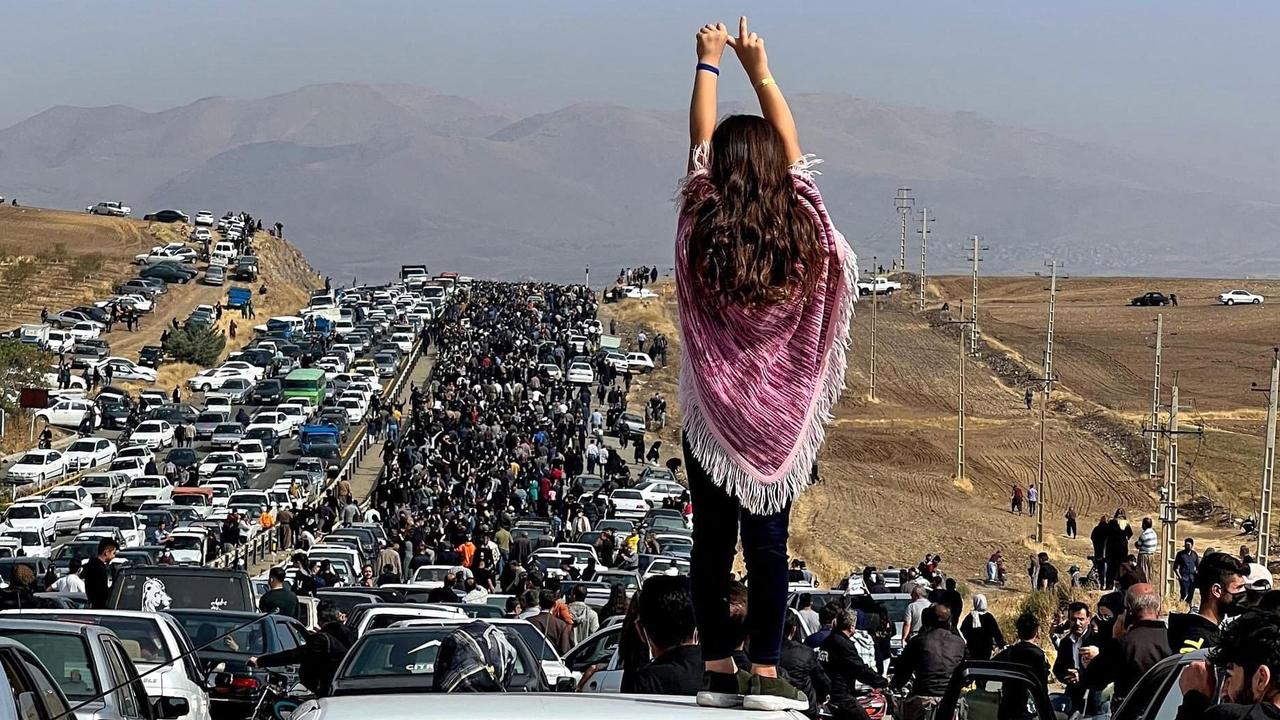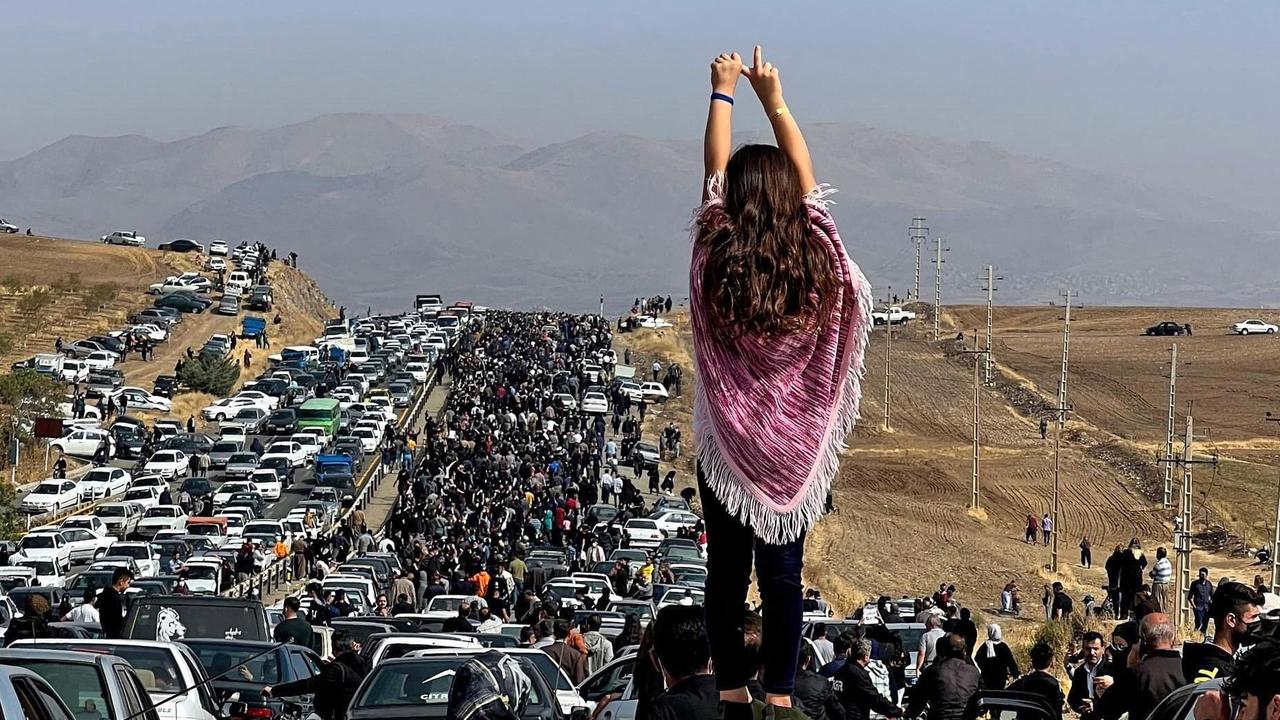Iran is sliding into hell on Earth as hundreds learn their fate
With 18,000 people detained and an execution spree imminent, this country is descending into hell while the world watches on. WARNING: Distressing.

WARNING: Distressing.
It took less than a month to investigate, arrest, judge and execute two young protesters in Iran. Now the trouble-torn nation is bracing itself for a killing spree.
On Monday, Majid Reza Rahnavard, 23, with hands and feet bound and a black bag over his head, was hanged from a crane in the centre of his hometown of Mashhad, northeast Iran.
Pro-government media broadcast footage of the event, including masked security personnel standing among concrete barriers to hold back the crowd.
He was arrested on November 15 and charged with allegedly killing two paramilitary police. He was not permitted a lawyer nor allowed to see the evidence. His trial was held in secret.
They allowed #MajidRezaRahnavard’s mother to visit him, and didn’t speak of execution at all. She left smiling and hoping that her son would be released soon.
— 1500tasvir_en (@1500tasvir_en) December 12, 2022
This morning she arrived when her son’s murderers were burying his dead body alone.#StopExecutionInIranpic.twitter.com/9n2k02uE60
Shortly after Majid’s execution, Iranian state-controlled media announced up to 30 people – including three children – had been charged with moharebeh (waging war against god). One is a 26-year-old professional international football player.
But a further 18,000 people detained since protests first erupted in mid-September face a similar fate. They are yet to front the judiciary.
Iran has conducted more than 560 formal executions so far this year alone.
But it was the death of a 22-year-old Kurdish-Iranian woman which proved to be the final straw for the people of Iran.
Mahsa Amini was arrested in September by morality police for “not wearing her headscarf in the correct manner”. She was released from police custody in a coma and died a few days later from severe head wounds.

Iranian state-controlled media attempted to brush aside allegations of brutality, saying Mahsa had suffered “a heart attack” while being “convinced and educated” in proper moral conduct.
More than 488 demonstrators have since been killed as authorities attempt to crack down on growing civil unrest, reports Human Rights Activists in Iran (HRAI), a group which has been monitoring the protests.
Now it fears the Islamic Shia government is on the brink of unleashing a devastating series of show trials and public executions to intimidate its population into submission.

Warring against god
Moharebeh is a Farsi word meaning “waging war against god”. It’s a charge that has regularly been rolled out against Iranian political dissenters and human rights activists since the 1979 Islamic Revolution. It carries the death penalty.
Now Iran’s theocratic (religious) government wants everybody to know that to oppose them is to oppose god.
“Indeed the requital of those who wage war against Allah and His Apostle, and try to cause corruption on the Earth, is that they shall be slain or crucified, or shall have their hands and feet cut off from opposite sides, or be banished from the land.”
So read a Quranic verse displayed on a banner at Majid’s public execution.
#MohamadBroghani has met his mother today and this adds to the concerns over the danger of his imminent execution. Mohamad's death sentence has been confirmed in the “Supreme Court.†Mohamad is only 19 years old and his precious life is in danger.#StopExecutionInIranpic.twitter.com/A4aqMcZX4t
— 1500tasvir_en (@1500tasvir_en) December 13, 2022
But one leading Iranian religious leader, Molavi Abdolhamid, has denounced the executions. He spoke out after the first protester, Mohsen Shekari, was executed on December 8 for injuring a security guard during a protest in capital Tehran in September.
“The man’s execution was incorrect and against sharia law,” the Sunni leader said at the weekend. “Where is it written in sharia that for killing one Basij member, five people should receive the death sentence – and in such a short time?”
He added: “[The protests] will not be extinguished by killing people.”
Messengers of murder
“We fear that other protesters under death sentences or charged with capital offences are at imminent risk of being sent to their deaths, Amnesty International Middle East and North Africa deputy director Diana Eltahawy said. “The clear aim is to instil fear among the public in a desperate attempt to cling to power and end the popular uprising.”
The international human rights group said 12 other protesters have been issued a death sentence so far. Another six face “imminent” trials.
FIFPRO is shocked and sickened by reports that professional footballer Amir Nasr-Azadani faces execution in Iran after campaigning for women’s rights and basic freedom in his country.
— FIFPRO (@FIFPRO) December 12, 2022
We stand in solidarity with Amir and call for the immediate removal of his punishment. pic.twitter.com/vPuylCS2ph
“[International professional footballers’ association] FIFPRO is shocked and sickened by reports that professional footballer Amir Nasr-Azadani faces execution in Iran after campaigning for women’s rights and basic freedom in his country,” the FIFPRO World Player’s Union tweeted on Thursday. “We stand in solidarity with Amir and call for the immediate removal of his punishment.”
He is one of several high-profile local figures detained by Iran’s religious police.
“We fear for the life of Iranian artists who have been indicted on charges carrying the death penalty,” a UN Office of the High Commissioner for Human Rights (UNOHCHR) statement read.
It said Kurdish rapper Saman Yasin has been sentenced to death after being convicted of moharebeh. Another rapper, Toomaj Salehi, was accused of “spreading corruption on Earth” (another definition of moharebeh). He faces trial without a lawyer and in a closed court.
Both had released songs critical of the government.
Dissident rapper Toomaj Salehi had the first day of his so-called "trial" today in Tehran without a lawyer of his choice.
— IranHumanRights.org (@ICHRI) November 26, 2022
He has been charged with "Mohareb" (waging war against God), which could be punishable by death. #MahsaAmini#Iran#مهسا_امینی
#توماج_صالØÛŒpic.twitter.com/EBi61zqDUR
“These arrests and indictments appear solely to be related to the peaceful exercise of their legitimate right to freedom of artistic expression and creativity,” the UNOHCHR report said. “They are only aimed at silencing dissenting voices in the country and constitute undue restrictions on the right of all persons in Iran to enjoy and have access to the arts and to take part in cultural and public life.”
Amnesty International said it has a copy of a document signed by a senior Iranian police commander demanding the execution of prisoners “completed in the shortest possible time”, with sentences carried out in public as “a heartwarming gesture towards the security forces”.
Born in blood
Iran’s foreign ministry has accused Australia of having a “dark” record on human rights that “deserves international attention and reaction”. The claim came after Canberra imposed sanctions against senior members of Iran’s ruling regime, morality police and the Basij paramilitary group.
“The decision by Australia is an example of interference in Iran’s internal affairs and incitement and promotion of violence and hatemongering,” Foreign Ministry spokesman Nasser Kanaani accused. “The Government in Canberra has been for many years violating the basic rights of Australia’s native inhabitants, prisoners and asylum seekers.”
But Iran has a long history of waging war against itself.
In 1988, Supreme Leader Ayatollah Khomeini ordered the summary execution of thousands of political prisoners to crack down on political dissent. The death toll is believed to have been anywhere between 2800 and 5000 people over 32 cities.
URGENT APPEAL:
— Masih Alinejad ðŸ³ï¸ (@AlinejadMasih) December 14, 2022
These two Kurdish brothers, #FarhadTahaZadeh and #FarzadTahaZadeh from the city of #Oshnaviyeh, risk imminent execution for protesting against the Islamist regime in Iran. Their lives are in danger. We need their names on spotlight of the international community pic.twitter.com/WLcHykzzGP
In 2009, a disputed presidential election reportedly resulted in 72 deaths. The public hanging of victims via mobile crane was also a feature of this “Green Revolution”.
In November 2019, protests erupted over an unexpected fuel price rise. An estimated 304 people were killed within a week.
Meanwhile, analysts are struggling to understand the implications of the three-month-old protests.
“One sign that the Iranian government might be willing to make some concessions to the protesters was the recent announcement that the ‘morality police’, who walk the streets enforcing hijab law, may be disbanded,” University of Essex international law expert Sahar Maranlou said. “
Some are sceptical this will definitely go ahead. But, if it did, it would be a significant move signalling that the protesters have had more impact than previous movements. However, the fear of more executions as a tool of control is unabated.”
Jamie Seidel is a freelance writer | @JamieSeidel






